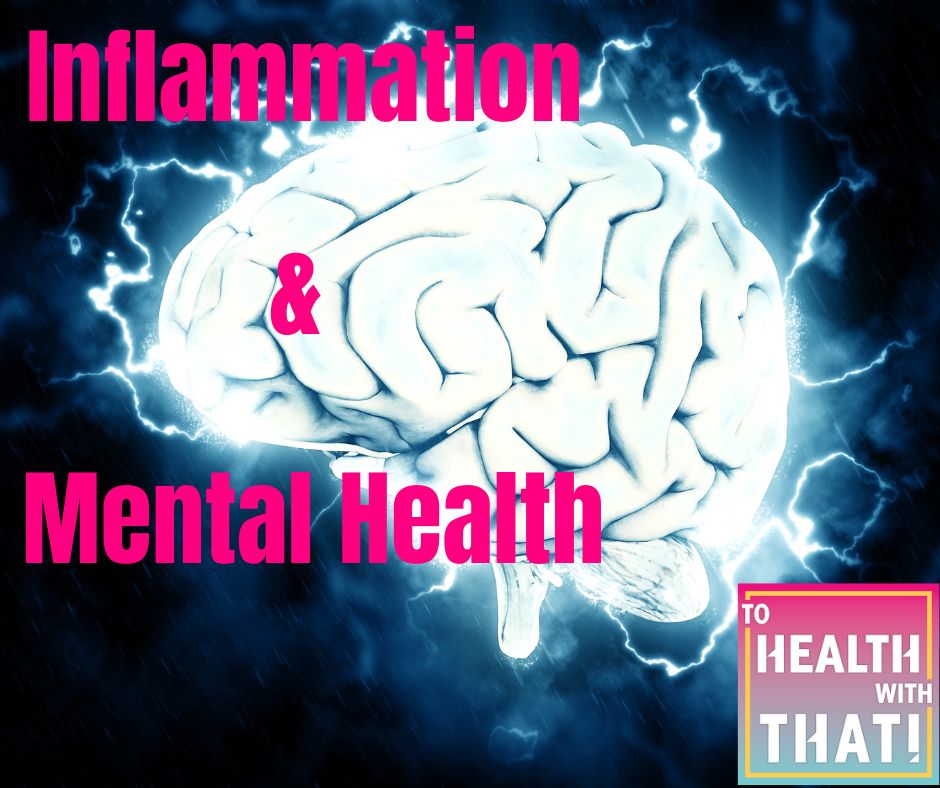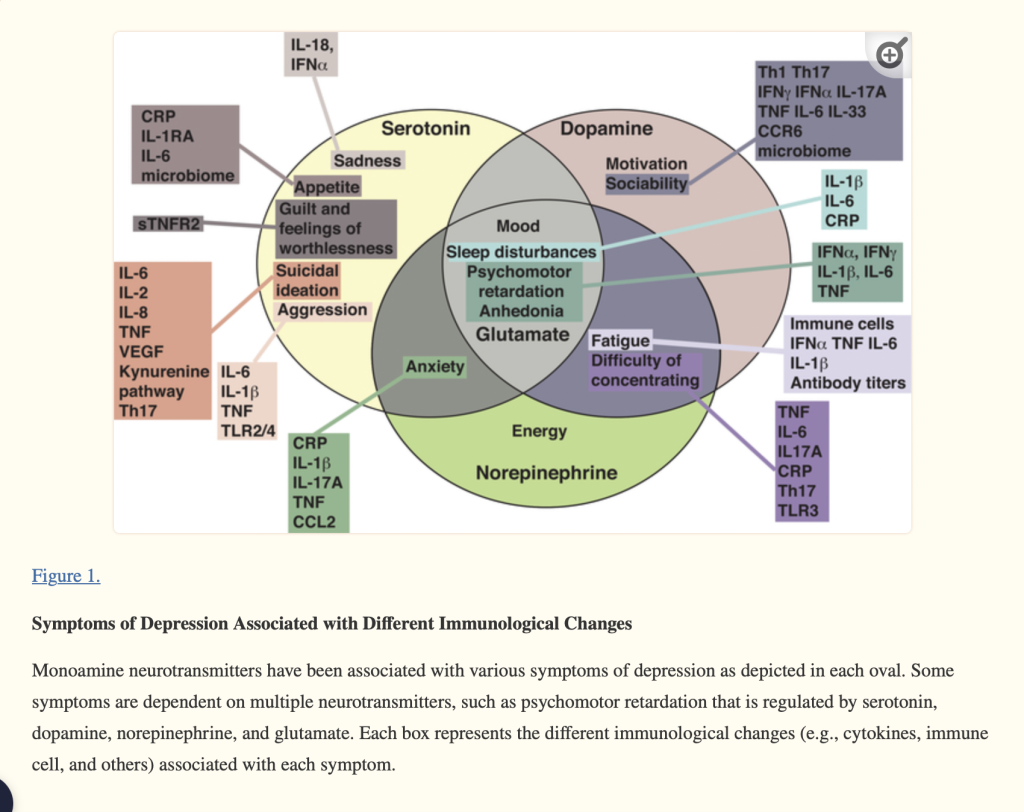
We blame neurotransmitters for everything mental health, but should we?
We blame neurotransmitters for everything, and try to fix all mental health disorders with neurotransmitters. Depression must be low serotonin, anxiety must be too low or too high norepinephrine. But this view is limited and ignores a well-researched link between inflammation and mental health.
Inflammation is likely a critical disease modifier, promoting susceptibility to depression. Controlling inflammation might provide an overall therapeutic benefit, regardless of whether it is secondary to early life trauma, a more acute stress response, microbiome alterations, a genetic diathesis, or a combination of these and other factors.
Beurel E, Toups M, Nemeroff CB. The Bidirectional Relationship of Depression and Inflammation: Double Trouble. Neuron. 2020 Jul 22;107(2):234-256. doi: 10.1016/j.neuron.2020.06.002. Epub 2020 Jun 17. PMID: 32553197; PMCID: PMC7381373.
Inflammation and depression represent a chicken-and-egg scenario. It is unclear if inflammation causes depression, depression causes inflammation, or if there is a more complex interaction at play. The study cited above, published in the journal Neuron, shows predictable changes in inflammatory particle levels corresponding with particular symptoms and neurotransmitter levels.
This suggests that pro-inflammatory molecules, called cytokines, are being overproduced in these various states of mental health dysregulation.

Does Reducing Inflammation Help Depression and Anxiety?
According to the research, the answer is a resounding yes.
Anti-inflammatories like fish oils and even over the counter NSAID pain relievers have long been known to have an anti-depressant action, but nobody really knew why. Now, we’re finding out that the reason could be as simple as the action we already knew they were good at – reducing inflammation. Even NSAID drugs (non-steroidal anti-inflammatories) like ibuprofen or naproxen show antidepressant effects that were researched solely because patients who used them regularly kept reporting better moods as a “side effect.”
This cytokine action could be the missing link. Of course, taking NSAIDS long-term isn’t a solution because they have a risk of gastrointestinal side effects and aren’t intended for long-term use. Reducing inflammation naturally, however, could be just the thing to help get your anxiety, depression, and other mental health issues managed.
Ways to Manage Inflammation for Mental Health
Mental health is usually a long game, so we’re looking for strategies that can be used long-term without harmful effects.
- Fish oil is the gold standard natural antiinflammatory and that goes for mental health as well. Fish oil is dose-dependent, so work with a practitioner to increase your dose until you see mental health benefits. The dose on the bottle is really just a good starting place.
- Turmeric is an excellent anti-inflammatory, which could be turmeric in food, made into golden milk (one of my favorites), or taken as a supplement. Dose matters here, so if you’re getting it from your food, ensure you’re getting good amounts regularly. As a supplement, it is important to look for liposomal turmeric because the active components are fat-soluble. Either that, or a turmeric product that has gone through a process to make it water soluble (these will be expensive and also patented – like Meriva from Thorne Research).
- Antioxidants – all antioxidants are also anti-inflammatory because reducing free radicals usually reduces inflammation. Look for antioxidants that are known to have good brain effects, like gamma-tocopherol (a form of vitamin E), EGCG from green tea, resveratrol, alpha lipoic acid, CoQ10, NAC, liposomal glutathione, and many more. Antioxidants are always a great addition to your health routine, and they are also dose dependent, so you can experiment with dosage to find the best amount for your body.
- Anti-inflammatory diet – eating to reduce inflammation is one of the best things you can do for your health long-term on every level. This typically means a nutrient dense diet with lots of fruits and vegetables, whole grains in moderation, good quality proteins from lean meat, eggs, dairy if you tolerate it, nuts, and seeds. Also, it means avoiding sugar, artificial sweeteners, processed foods, and junk food as much as possible.
- Eliminate Food Sensitivities – food sensitivities trigger a strong immune response by your body, and that immune response activates cytokines and other inflammatory particles. By eliminating these trigger foods from your diet you can save your body a lot of work and a lot of inflammation.
- Saffron – saffron, like turmeric, is a highly-pigmented spice used in cooking and more recently in supplements. It has been shown to have good effects on mood disorders including anxiety and depression and is likely to have strong general antiinflammatory effects. Saffron is also though to have some effects specific to the brain tissue and may be a nootropic (may encourage the formation of new neurons and the protection of existing ones).
- Polyphenols – polyphenols from a variety of healthy foods including citrus, coffee, tea, beans, nuts, soy, grapes, legumes, and spices have been shown to alleviate depression in a dose dependent way. This means higher dietary intake of foods high in these beneficial compounds leads to lower depression.
MTHFR is a common genetic mutation that can contribute to anxiety, depression, fatigue, chronic pain, infertility, and more serious conditions like breast implant illness, heart attack, stroke, chronic fatigue syndrome, and some types of cancer. If you know or suspect you have an MTHFR variant, schedule a free 15-minute meet-and-greet appointment with MTHFR expert Dr. Amy today.
Book Your Appointment
